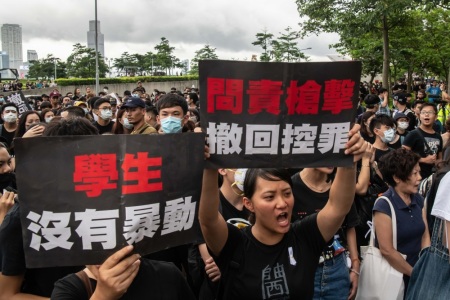'Sing Hallelujah to the Lord' marks Hong Kong anti-extradition protests, 'anthem' of demonstration

As record numbers demonstrate in the streets of Hong Kong to protest a proposed extradition law and the mainland Chinese government, a Christian song penned in 1974 has become an "unofficial anthem."
Christian groups in the autonomous territory in southeastern China of approximately 7.4 million people — a former British colony — have been singing "Sing Hallelujah To The Lord" by Linda Stassen-Benjamin while protesting and marching in the streets. The song, which is catchy and simple in melody, is popular around the world and has been translated into many languages.
The demonstrators have also been protesting against police brutality. The authorities apparently have a distaste for the Christian song, as evidenced by one sign a protester carried, which reads: "Stop Using Baton Or We Sing Hallelujah To The Lord." Numerous clips of protesters singing the hymn have been posted to Twitter and other social media.
Approximately 2 million protesters have taken to the streets to express their opposition over a proposed law that would send suspected criminals to be extradited to mainland China to be prosecuted and to demand that China-backed Hong Kong chief executive Carrie Lam resign.
Reports indicate that although further action on the contested extradition law has been suspended though not completely scrapped, the protesters, many of whom are young, are continuing to push back. Demonstrators fear the Chinese government will employ the proposed law to target and effectively silence their critics.
In addition to the Christian hymn, the protesters have being singing "Do you hear the people sing" from the musical "Les Miserables."
The presence of Christians and others singing "on the front lines of the protests were helpful in making the demonstrations look more like an outdoor worship service rather than the 'organized riots' the government said it had to crack down on to bring back law and order," Shanghaiist noted Sunday, calling the 1974 song the "unofficial anthem" of the uprising.
Meanwhile, China has been censoring the Hong Kong protest demonstrations on the mainland. When an internet user there keys “Hong Kong” into Baidu, China's largest search engine, no news of the protests turns up.
Government censors have also scrubbed “Do you Hear The People Sing,” from online music streaming services.
Among the Christian leaders within Hong Kong's Christian community speaking out against the extradition bill is Chinese Catholic Cardinal Joseph Zen, bishop emeritus of Hong Kong who has been a vocal critic of China for decades, has asked Catholics to pray for the situation, has spoken at anti-extradition rallies, and convened a Mass to pray for Hong Kong.
The Catholic diocese has issued an official statement urging the Hong Kong government to slow down with regard to the law's passage.
Chu Yiu-ming, pastor of Chai Wan Baptist Church in Hong Kong is among the Protestant clergy seen at the protests singing the famous hymn. The Baptist leader was also a leader in 2017 push demanding universal voting rights in Chief Executive elections.
The Chinese government has been cracking down on religious expression in recent months and years, intensifying its efforts to rid the mainland of Christian symbols by removing crosses from churches and replacing them with Chinese flags and by demolishing "unregistered" churches and mosques.
The Hong Kong protests have occurred mere days after the 30-year anniversary of the Tiannamen Square massacre, known as the '89 Democracy Movement, that the Chinese government brutally repressed.





















